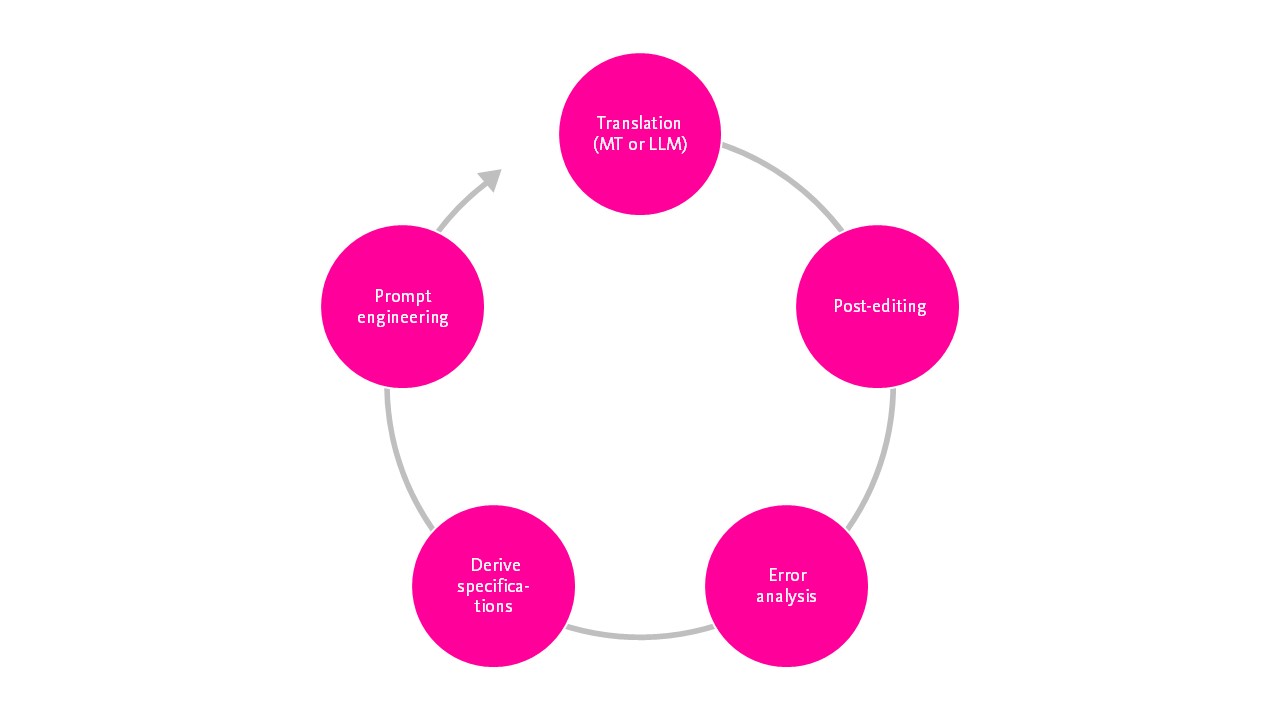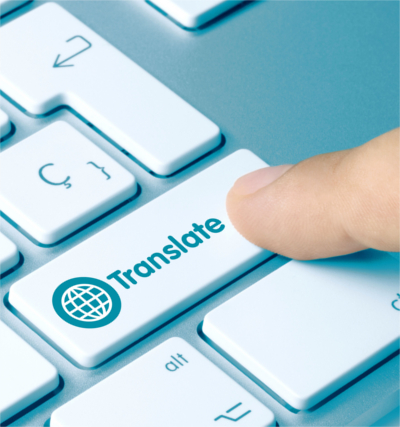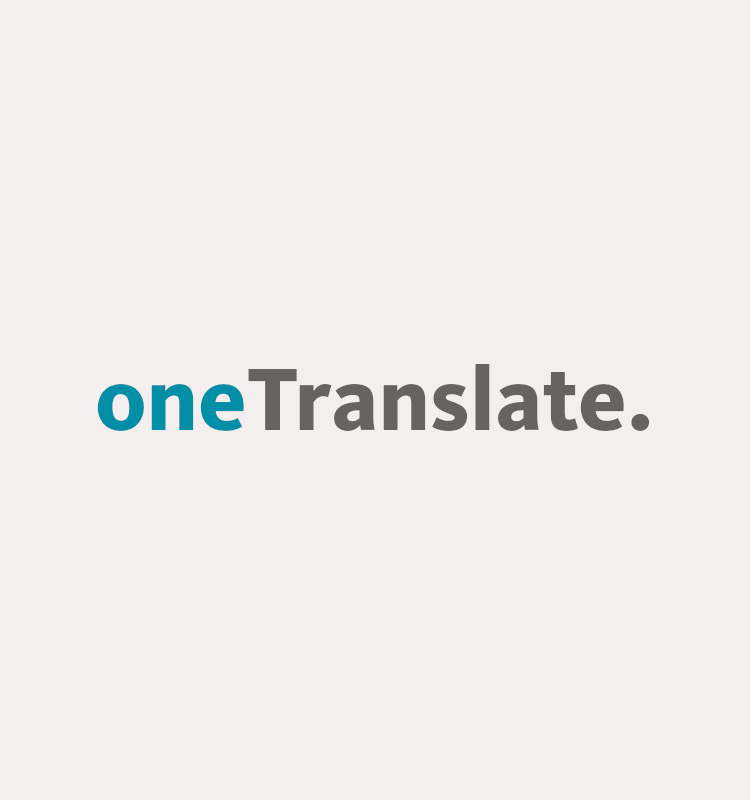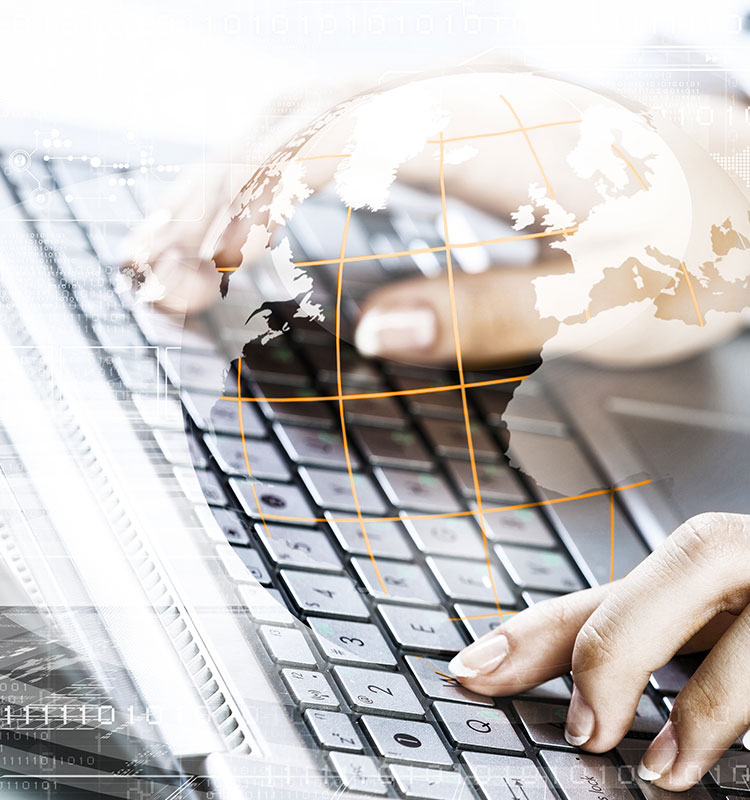
Table of contents
Machine and AI-supported translations – from oneMTPE to oneAI for every requirement
Neural machine translation (NMT) – the powerful standard for modern MT systems
Clean data as the basis for successful AI translations
Quality factors for AI-supported translations
oneTranslate: data-secure instant AI translations for companies
Machine and AI-supported translations – from oneMTPE to oneAI for every requirement
Everyone is talking about machine and AI-assisted translation, and it’s available everywhere at the touch of a button. Thanks to MT based on artificial intelligence, translations can now be produced quickly, inexpensively and to an acceptable quality in many languages. These practical everyday helpers are certainly adequate for some purposes, such as gathering information quickly, internal communication and social media. However, to date, no MT system has been able to translate specialised texts, technical documentation or product descriptions into a target language completely and consistently and without errors, or formulate marketing messages in a way that is appropriate for the target group.
oneMTPE – the proven AI translation standard since 2017: fast, scalable, high-quality
oneMTPE is our service that encompasses AI translations and is used by many of our customers. Thanks to our many years of experience in professional post-editing (PE), our ISO 18587 certification and our in-house team of experts, companies from all industries benefit from the combination of technology and human expertise. With oneMTPE you can get started with machine translation immediately!
Jasmin Nesbigall
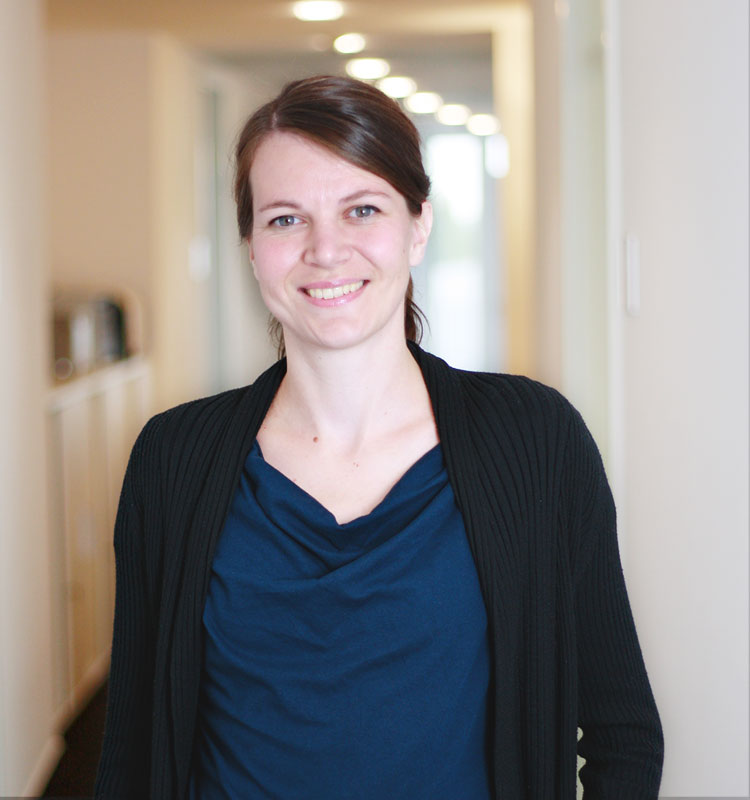
Neural machine translation (NMT) – the powerful standard for modern MT systems
The standard in MT systems is neural machine translation (NMT). Although NMT translations cannot yet fully compete with human translations, they form an excellent framework for increasing translation productivity many times over, as a raw translation intelligently combined with a translation memory, terminology and human language proficiency.
There are different types of system. If an MT system has only been trained with generally available content, it is a generic system. On the contrary, domain- or company-specific MT systems are trained specifically for a particular domain or company and therefore usually deliver more accurate results.
We draw on the services of the current and future market leaders in neural machine systems. The NMT system we recommend depends on the source and target languages and the text types. The systems are seamlessly integrated into the translation process and supplemented by our oneMTPE services. As with all technologies, we only use MT systems that provide data security, which means that the texts are not re-used, are not stored permanently, and are securely protected from access by third parties.
Your benefits
- Individual advice from our team of MTPE experts
- Seamless integration of the MT system into existing processes and system landscapes
- Leading systems and the highest degree of data protection
- Tailored to your own goals and requirements
Come and talk to us about our seamless processes and sustainable success with MTPE and about the fields of application and performance indicators of machine translation. Our team of MT experts will provide you with expert support as a partner in all strategic and practical issues.
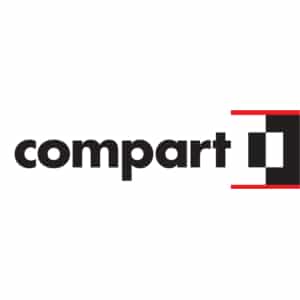
“For many years now oneword has been supporting us as a reliable and innovative partner in implementing our translation workflows for software documentation. In addition to handling classic translation projects, oneword now accompanies us on the new path of machine translation and post-editing. By introducing the new workflows, we benefit from the efficiency advantages of machine translation without sacrificing the quality we are accustomed to.”
AI translation with Large Language Models (LLMs) – the next generation of machine translation technology
Large Language Models (LLMs) herald a new era in machine translation. LLMs were not developed specifically for translation, but for general language comprehension. However, thanks to multilingual training materials, they learned to translate virtually ‘on the side’ – and they are very good at it. Thanks to their broader understanding of context, they are better able to grasp linguistic, stylistic and cultural nuances and deliver more coherent results for larger portions of text.
LLMs are particularly strong at free translations but also at revising foreign-language texts. Using suitable prompts, output that has already been generated can be customised to specific requirements, for example a particular style or a different target audience. LLMs have the clear advantage of being trainable, such that the prompt given to the LLM can be adapted based on user specifications or previous sources of error. This enables the system to learn iteratively and, in the best case scenario, leads to significantly less post-processing work.
With our oneAI service, we now provide our customers with a trainable AI translation solution in a data-secure environment – individually customisable and specially designed to meet a company’s specific requirements.
However, just like classic MT systems, LLMs also have some weaknesses, including hallucinations and the incorrect use of terminology. Furthermore, two identical queries will rarely produce the same result. This means that AI translations also require additional work, through post-editing.
Linguistic prompt engineering – language expertise for optimal AI translations with minimal post-editing effort
For many years, it has been possible to train MT systems for specific companies so that a targeted approach can be taken to specialised terminology, style and tone. However, MT training used to be very costly and time-consuming. Using Large Language Models changes this significantly. This is because LLMs can implement specifications using suitable prompts – both on a one-off basis and for the long term by appropriately fine-tuning an existing model.
To do this, the specifications must be analysed and “translated” into suitable prompts. The same applies to previous sources of error from MTPE processes, which can be used to derive rules for future translations. Linguistic prompt engineering of this kind requires linguistic and technical expertise in order to provide a Large Language Model with all the linguistic and formal requirements for a translation. Correct implementation by the LLM can then lead to significantly less subsequent work during post-editing.
Clean data as the basis for successful AI translations
Large Language Models learn from the texts they are trained with. Language data, such as translation memories and terminology data, represent an important linguistic asset because they contain multilingual company data and are enriched with additional information. However, language data often grows massively, especially in TMs, without regular clean-up procedures. Since the quality of the data is crucial for AI to be used appropriately, cleaning up the data is very important.
With our service oneCleanup, we offer a clean-up analysis for TM and terminology data. We analyse the potential for cleaning up your data and provide you with an overview of where you can start. oneCleanup also helps to clean up your databases with a semi-automatic process so that you can achieve visible results quickly. Glossaries can then be extracted from the cleaned-up terminology data so that they can then be integrated directly into the machine translation process.
Quality factors for AI-supported translations
Machine translation with MTPE has become an established, standard procedure that is used across all industries. Even if the quality of the machine pre-translation is already very high, translation projects are never finished with the result of the machine generated at the push of a button. The following factors in the process play a decisive role in improving the MT output:
- Defining the criteria and requirements
With your and our combined expertise, we establish the desired quality and which other systems, such as CAT, MT, LLM and terminology systems, should be used to optimise the quality and workflow. - Feasibility analysis
With our analysis procedure, we check the output quality that can be achieved, what the specific benefit-cost ratio will be and whether, how and with what potential savings your machine-based future can start. As a first step, even before the feasibility analysis, take our free checklist, “Are you ready for MTPE?” (DE). - Post-editing
Our post-editing process is certified to ISO 18587 and is based on a core translation team principle. To enhance the quality of the output, the post-editing process evaluates the errors, records the terminology and provides systematic feedback. These results are essential for a sustainable MT workflow and linguistic prompt engineering. - Compiling terminology – corporate language
Generic MT systems cannot map a company’s specific vocabulary as a native feature. Therefore, it is crucial to have specified terminology for post-editing purposes. This can now be integrated into many systems using a glossary or a database using systematic terminology work, with which we will support you closely. We compile your industry-specific specialised vocabulary and your specific corporate language as a terminology base so that human translators and translation engines can access it. - Feedback analysis
The feedback analysis after the project has been completed is just as important as the feasibility analysis before the project starts. This allows error patterns and specific sources of error to be recognised and rules and guidelines to be defined. These are incorporated into style guides, terminology databases or prompts in order to sustainably improve the quality of the results.
Would you like to learn more about the individual quality factors? Contact us for an initial, non-binding conversation with our MTPE experts using the following link or directly and personally on +49 7031 714 9550.
Jasmin Nesbigall

oneTranslate: data-secure instant AI translations for companies
Free translation engines, such as DeepL or Google Translate, now often deliver good results and are quick and easy to use. In terms of data security and quality, however, they are questionable, as they know neither the company nor its specific terminology, which can quickly lead to inconsistent and incorrect translations.
oneTranslate – a component of oneSuite – offers companies all the benefits of AI-supported instant translation, but without these risks. oneTranslate provides data-secure access to established LLM and NMT systems and ensures that your individual specifications are taken into account and implemented consistently by integrating your company’s own translation memories (TMs) and terminology databases. This enables employees to enter texts or entire files in various formats using a convenient screen and to have them translated quickly and securely.
Would you like to learn more about our instant translations with oneTranslate or receive a live demo? Then contact us right away!
8 good reasons to choose oneword.
Learn more about what we do and what sets us apart from traditional translation agencies.
We explain 8 good reasons and more to choose oneword for a successful partnership.

